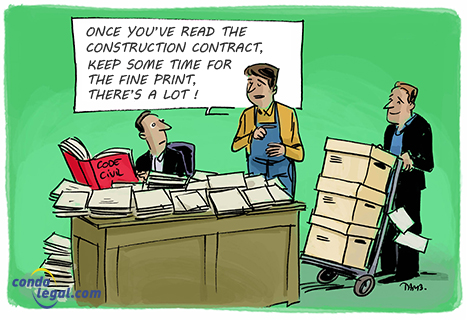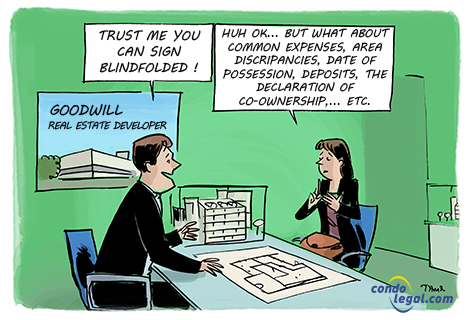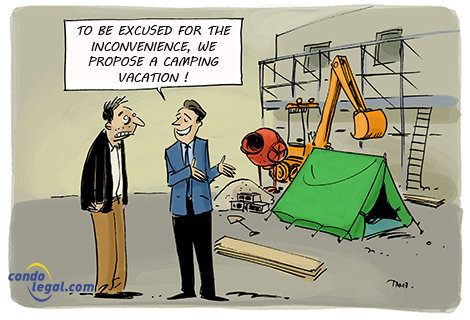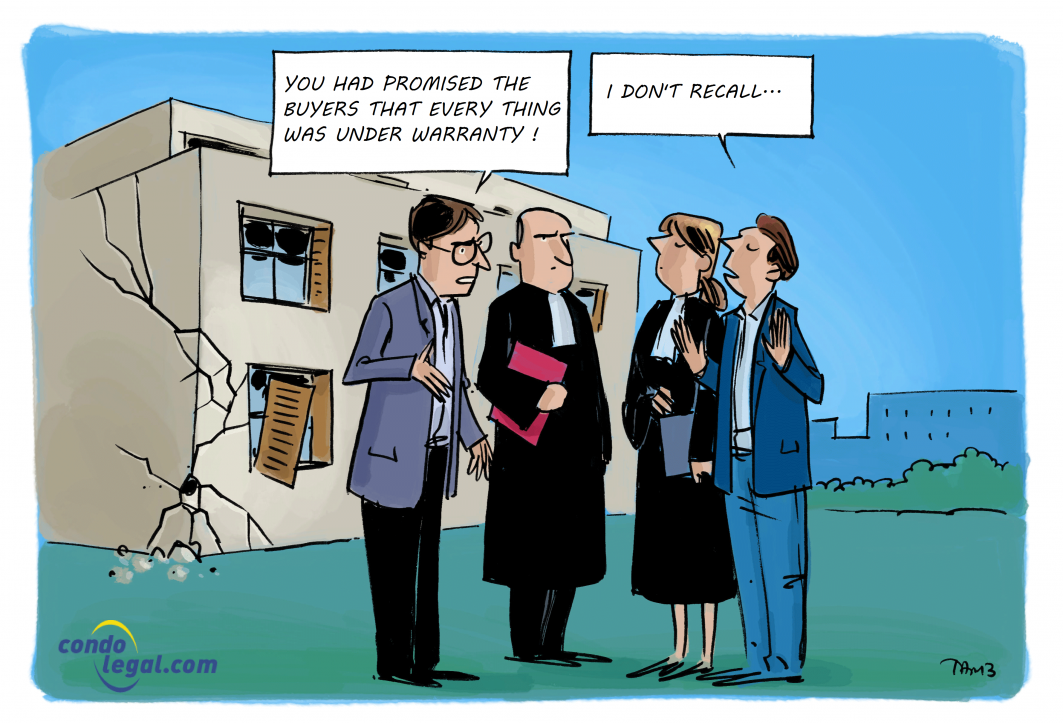 The law has provided legislative provisions for syndicates of co-owners to ensure they are protected in the event of poorly executed work (article 1081 of the Civil Code of Quebec). The legislator aims to address the issues that may arise following a construction project. When work is carried out in common areas, the syndicate benefits from several legal guarantees. These include guarantees for poor workmanship, hidden defects, and loss of the structure. All these rights are extremely valuable, considering that the cost of work in a co-ownership is often very high.
The law has provided legislative provisions for syndicates of co-owners to ensure they are protected in the event of poorly executed work (article 1081 of the Civil Code of Quebec). The legislator aims to address the issues that may arise following a construction project. When work is carried out in common areas, the syndicate benefits from several legal guarantees. These include guarantees for poor workmanship, hidden defects, and loss of the structure. All these rights are extremely valuable, considering that the cost of work in a co-ownership is often very high.
One-year warranty against poor workmanship
The contractor has the obligation to guarantee its work against poor workmanship, present at the time of the acceptance of the work or discovered during the year following acceptance. Article 2120 of the Civil Code of Québec stipulates that "The contractor, the architect, the engineer and the professional technologist, for the work they directed or supervised, and, where applicable, the subcontractor, for the work he performed, are jointly bound to warrant the work for one year against poor workmanship existing at the time of acceptance or discovered within one year after acceptance."
This warranty is in two stages: the acceptance with reservation, conditional upon the contractor carrying out apparent corrective work. And the warranty that remains in force for one year, following the acceptance of the common portions, to correct any other poor workmanship discovered. If such poor workmanship is found in the following year, it will be required that the persons concerned be put on formal notice. The formal notice has two objectives: to notify the people involved, and to compel them to carry out the corrective work.
It should be noted that a recourse under article 2120 of the Civil Code of Québec does not require proof that the defect or the poor workmanship jeopardizes, in the immediate or short term, the integrity of the work or that it limits the use that could be made of the immovable.
Three-year warranty against hidden defects
Article 1726, paragraph 1 of the Civil Code of Québec provides that "the seller is bound to warrant the buyer that the property and its accessories are, at the time of the sale, free of latent defects which render it unfit for the use to which it was intended, or which so diminish its usefulness, that the buyer would not have bought it or paid so high a price, if he had been aware of them.” In other words, a hidden defect prevents the buyer from enjoying - as he was entitled to expect - the property sold and its accessories. The warranty for hidden defects protects the buyer against defects that deteriorate the immovable in whole or in part.
In addition, the warranty for hidden defects applies to the goods and materials needed to carry out work in the common portions. The contractor who supplies them is obliged to guarantee their quality, and to ensure that they are suitable for the work. In addition, they must offer the same warranty as those of a seller of goods, more particularly with regard to hidden defects.
The defect must be the object of a prior notice notified in advance sent within a reasonable timeframe after its discovery, unless it involves a professional seller. A demand letter specifying the corrections to be made must also be addressed to the persons concerned, as well as a formal notice that may be transmitted simultaneously time. In addition, the judicial remedy must be undertaken within three years of the discovery of the defect, under penalty of being statute barred (prescribed).
Five-year warranty against loss of the work
The contractor also has the obligation to warrant its work against faulty design, construction or execution of the work or defect in the ground, resulting in the loss (partial or total) of the work. In this regard, the law provides for a deemed liability regime. Thus, article 2118 of the Civil Code of Quebec stipulates that: "Unless they can be relieved from liability, the contractor, the architect and the engineer who, as the case may be, directed or supervised the work, and the subcontractor with respect the work performed by him, are solidarily liable for the loss of the work occurring within five years after the work was completed, whether the loss results from faulty design, construction or production of the work or defect in the ground.”
This warranty allows the syndicate to be protected against defects that may result in the loss of the work, or a limitation to the use of the immovable. Case law interprets this provision liberally, recognizing that defects related to the essential elements of an immovable, as well as those that cause serious inconveniences to the main components (including the accessories of the main construction incorporated into the construction work ), could also be included in the situations covered by Article 2118.
Warranties offered by the contractor and certain associations
In addition to the legal warranties, which apply in any case, in accordance with the conditions that govern them, the contractual liability of the contractor may also be invoked, under the legal contractual regime. The contractor may also offer additional guarantees.
The contractual warranty is offered by the contractor for renovation work. When a contract is signed with a syndicate, the latter must ensure that the terms and conditions related to this guarantee be mentioned therein. This is an essential condition, so that it can assert its rights, if necessary. Some associations of contractors offer such a warranty. If your contractor is a member of one of these associations, your syndicate may, under certain circumstances, benefit from the warranty offered by these associations.
License security
The law provides that any contractor who applies for a license to the “Régie du bâtiment du Québec” (Québec Construction Board) must deposit a license security. This security warrants his contractual obligations. If necessary, it would compensate a customer who has suffered damage as a result of the non-performance or improper performance of construction work. It would cover advances paid, non-completion of work, poor workmanship and defects discovered within one year after the completion of the work, with the exception of those covered by a mandatory warranty plan for new residential buildings. As specified by the Régie du bâtiment du Québec (RBQ), the license security covers:
 WHAT YOU SHOULD KNOW! The license security is an amount provided for by the Building Act. This amount will allow a contractor to warrant its contractual obligations. If it cannot be maintained, the Régie du bâtiment du Québec (RBQ) will recommend that the license be suspended. All contractors who apply for a license must deposit this security bond with the RBQ, or an mandatary of the Quebec Government (la Corporation des maîtres mécaniciens en tuyauterie du Québec [CMMTQ] et la Corporation des maîtres électriciens du Québec [CMEQ].) (the Corporation of Master Pipe Mechanics of Quebec [CMMTQ] and the Corporation of Master Electricians of Quebec [CMEQ].) to guarantee the fulfillment of their contractual obligations.
WHAT YOU SHOULD KNOW! The license security is an amount provided for by the Building Act. This amount will allow a contractor to warrant its contractual obligations. If it cannot be maintained, the Régie du bâtiment du Québec (RBQ) will recommend that the license be suspended. All contractors who apply for a license must deposit this security bond with the RBQ, or an mandatary of the Quebec Government (la Corporation des maîtres mécaniciens en tuyauterie du Québec [CMMTQ] et la Corporation des maîtres électriciens du Québec [CMEQ].) (the Corporation of Master Pipe Mechanics of Quebec [CMMTQ] and the Corporation of Master Electricians of Quebec [CMEQ].) to guarantee the fulfillment of their contractual obligations.
 WHAT TO KEEP IN MIND: In addition to the license security, the liability of the stakeholders in the work may also be engaged, with regard to the duties incumbent upon them, particularly that of acting in the interest of a client with prudence and diligence, in accordance with the rules of the trade, and that of ensuring that the work completed or the service provided is in accordance with the contract.
WHAT TO KEEP IN MIND: In addition to the license security, the liability of the stakeholders in the work may also be engaged, with regard to the duties incumbent upon them, particularly that of acting in the interest of a client with prudence and diligence, in accordance with the rules of the trade, and that of ensuring that the work completed or the service provided is in accordance with the contract.
 WARNING! Before doing business with a contractor, make sure that he holds a building contractor's license issued by the Régie du bâtiment du Québec, (la Corporation des maîtres mécaniciens en tuyauterie du Québec [CMMTQ] et la Corporation des maîtres électriciens du Québec [CMEQ].) (the Corporation of Master Pipe Mechanics of Quebec [CMMTQ] and the Corporation of Master Electricians of Quebec [CMEQ].). The name of the contractor listed in the contract must match that of the company holding the license.
WARNING! Before doing business with a contractor, make sure that he holds a building contractor's license issued by the Régie du bâtiment du Québec, (la Corporation des maîtres mécaniciens en tuyauterie du Québec [CMMTQ] et la Corporation des maîtres électriciens du Québec [CMEQ].) (the Corporation of Master Pipe Mechanics of Quebec [CMMTQ] and the Corporation of Master Electricians of Quebec [CMEQ].). The name of the contractor listed in the contract must match that of the company holding the license.





.png)

